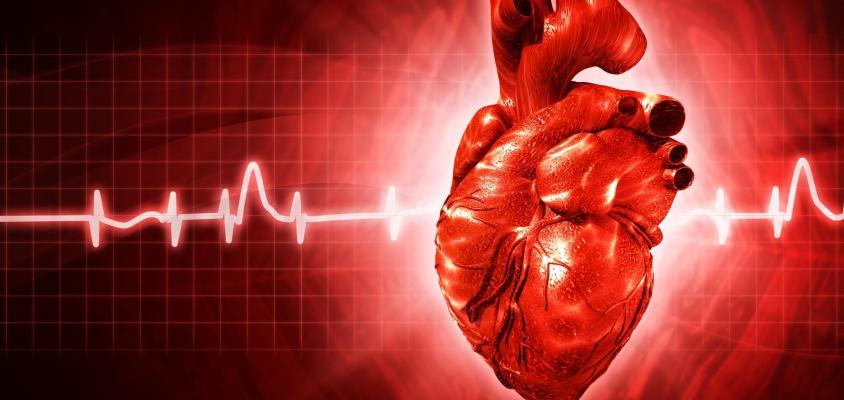Heart disease is both a common and serious health problem that affects many Americans. According to the American Heart Association, heart disease is the number-one cause of death in the U.S. and, each year, 360,000 people die from a heart condition. These heart disease statistics are alarming. Are you at risk for this serious health condition? Learn about the causes and symptoms today, for a healthier tomorrow.
What Is Heart Disease?
From TV to radio, to the internet, we hear about the dangers of heart disease, but do you really know what it is? Heart disease (or cardiovascular disease) isn’t one, but many conditions that affect your heart and blood vessels. We most often think of heart disease as blocked blood vessels which lead to other conditions like stroke and heart attack.
Cardiovascular Disease Causes and Types
There are several types of heart disease. The cause depends on the type you’re talking about. It can be congenital (inherited), self-induced, or environmentally induced. While a workup may begin with your primary care physician, diagnosis and treatment of these diseases will be managed by a cardiologist, or heart specialist, since it often requires specialized knowledge to be taken care of appropriately.
Coronary Artery Disease
There are numerous types of heart disease. The type that we most commonly think about is coronary artery disease. This is when plaque builds up in the elastic walls of the arteries and causes them to narrow and harden. This makes it so the heart cannot efficiently pump blood and, if it becomes serious enough, this deprives the body of nutrients and oxygen.
Cardiomegaly
Another type of heart disease is enlargement of the heart, also known as cardiomegaly. This is most often caused by coronary artery disease or high blood pressure.
Irregular Heartbeat
Irregular heartbeat is called arrhythmia in medical terms. With arrhythmia, your heart fails to keep what would be considered a normal rhythm. The heartbeat may be too fast or too slow. There are quite a few different types of arrhythmias but the ones most people tend to hear about the most are Atrial Fibrillation (also called AFib or AF) and Premature Ventricular Contractions (PVCs).
Arrhythmias can be caused by a heart attack, coronary artery disease, electrolyte imbalances, recovery from heart surgery, and changes in the heart muscle, and some individuals are born with heart rhythm irregularities.
Heart Valve Disease
Diseases of the valve come in two forms. Sometimes the valves become stiff or hardened, which we call stenosis. This means the valve doesn’t open completely, and it forces the heart to work much harder to pump blood. Other times, a valve is “leaky,” known as valvular insufficiency, which means the valve doesn’t close completely. When this happens, the valve may not seal completely and some of the blood flows backward.
doesn’t close completely. When this happens, the valve may not seal completely and some of the blood flows backward.
Valve disease is something you can be born with or can stem from an infection (especially some childhood diseases) or drug abuse. Some types of heart valve diseases require cardiac surgery, while others are relatively benign and unnoticed.
Disease of the Heart Muscle
Diseases of the heart muscle are called cardiomyopathy, also known as an enlarged heart. This disease is one that continually worsens rather than remaining at a particular stage. People with this illness suffer from an enlarged or thickened heart and/or loss of elasticity of the muscle. These issues cause the heart to have trouble pumping blood and, eventually, to fail.
Cardiomyopathy can be caused by a variety of things, including alcohol, heavy metal poisoning, drug abuse, coronary artery disease, and high blood pressure. Depending on the type of cardiomyopathy, it could also be caused by some cancer treatments, connective tissue diseases, and other chronic conditions. Cardiomyopathy can also be an inherited condition.
Heart Murmurs
A heart murmur is named for the sound heard when listening to the heart with a stethoscope. Most murmurs are not considered a problem and don’t require treatment. They can be caused by a condition that makes your heart beat faster than usual or from a valve issue. High blood pressure, fevers, anemia, and hyperactive thyroid can all cause a heart murmur. Only a cardiologist can decide if treatment is necessary.
Diseases You’re Born With – Congenital Heart Diseases
Some of the heart diseases above are congenital, but there are others, as well. For instance, Marfan Syndrome and DiGeorge Syndrome are congenital diseases that affect the heart. Marfan syndrome is a connective tissue disease that affects many of the body’s systems, including the cardiovascular system. DiGeorge Syndrome is a chromosomal defect that affects the development of body systems.
Heart Disease Risk Factors
While there are many different types of heart disease, there are several common risk factors. They are both self-created and environmentally produced. Some of these factors are preventable, while others cannot be controlled. Fortunately, the most frequent causes of heart disease are factors that can be controlled—like smoking, poor diet, and stress—which all contribute to heart disease.
Things You Can Control
Smoking
Smoking causes damage to your vessels. Carbon monoxide from cigarettes damages the inside lining of the arteries. This damage can make you prone to atherosclerosis or hardening of the arteries. The chemical nicotine causes blood vessel constriction, which is another dangerous side-effect of smoking.
Diet and Healthy Living
An unhealthy diet is also a risk factor for heart disease. Diets high in cholesterol, fats, sugar, and/or salt increase the possibility of heart disease. These diets contribute to the deposit of plaque in the arteries. Obesity also puts you at higher risk, as it tends to exacerbate other conditions.
By the same token, exercise is vital to keeping your heart healthy. Lack of physical activity is a factor in many types of heart disease since exercise is essential to keeping many of the body’s processes functioning appropriately.
Hygiene and Life Stressors
Body hygiene, from hand washing to dental health, is very important to heart health. Good hygiene diminishes the introduction of bacteria and viruses into the body and protects your cardiovascular system from damage. Dental health is particularly important to cardiovascular health and, if you already have a heart condition, you should pay close attention to this.
We already know that stress causes plenty of issues throughout the body. It’s also detrimental to your heart health. Stress can worsen other conditions you may have and has the potential to damage your arteries.
Contributing Conditions
Other Chronic Diseases
High blood pressure, high cholesterol, and diabetes are major risk factors for heart disease. High cholesterol deposits plaque in the arteries and leads to hardening of the arteries. Meanwhile, high blood pressure can cause narrowing and hardening of the vessels. Diabetes carries the risk factors of all the conditions it can contribute to, like high cholesterol, high blood pressure, obesity, and increased risk of infection.
Age and Gender
Age is also a contributing factor to heart disease. As you age, you become more at risk for issues like weakened heart muscles and narrowed arteries. Heart disease is a discriminator. It disproportionately affects men more than women. Women do experience an increase in risk after menopause; however, men are still are more often the victims of heart disease.
Your Genes
The last risk factor concerns your genes. If you have a family history of heart disease, then this makes it more likely that you could suffer from the issue as well. This is especially true if you have a parent or sibling who developed cardiovascular disease before the age of 55, or a female relative or sibling who experienced it before the age of 65.
The Environment Around You
Sometimes the environment around you can be toxic and disease-causing. Some of the environments capable of causing heart disease include various forms of air pollution. Some examples of this are emissions from fossil fuels, pollutants created during energy production, and chemicals let off during building and manufacturing. Other environmental factors for heart disease include molds, fly sprays, and, potentially, even air fresheners. Research is currently being done on many of these potential risks.
Cardiovascular Disease Symptoms
While it is difficult to condense the many symptoms of various cardiovascular diseases, there are some common symptoms. These include shortness of breath, nausea, chest pain, pain in the shoulders (especially the left), fatigue, lightheadedness or feeling faint, pain in the jaw, or cold sweats. Each individual illness may have additional or slightly different symptoms.
Learn the Heart Disease Facts
The Statistics
Here are some staggering statistics from the American Heart Association: 
- About 2,200 people in the United States die every day due to cardiovascular disease.
- Cardiovascular disease and strokes cost about $316 billion dollars a year in lost workdays and healthcare costs.
- 45.1% of U.S. deaths are caused by coronary artery disease.
- In the U.S., someone will have a heart attack around every 40 seconds.
Prevention
While other chronic conditions and your family history play a role in your total lifetime risk, there are things you can do to mitigate your risks. The following are great ways to prevent or lessen the risk of heart disease:
- Eat a healthy, balanced diet, including fresh fruits and vegetables.
- Get a good night’s sleep.
- If you’re a smoker, take necessary steps to quit.
- Reduce stress.
- Get regular physical activity.
- Avoid excessive salt intake.
- Control conditions like high blood pressure and high cholesterol.
The statistics are disturbing, but, with proper treatment, many patients can live long, full lives. If you or a loved one have heart disease or suspect you may be at risk, Crystal Run Healthcare’s cardiovascular specialists can give you the care you need. Call us at 845-703-6999 for more information!
Sources
1. https://www.heart.org/idc/groups/ahamah-public/@wcm/@sop/@smd/documents/downloadable/ucm_491265.pdf
2. http://www.webmd.boots.com/heart-disease/guide/environmental-risks-heart-disease
3. https://medlineplus.gov/ency/article/000418.htm
4. http://www.webmd.com/heart-disease/guide/heart-disease-symptoms-types
